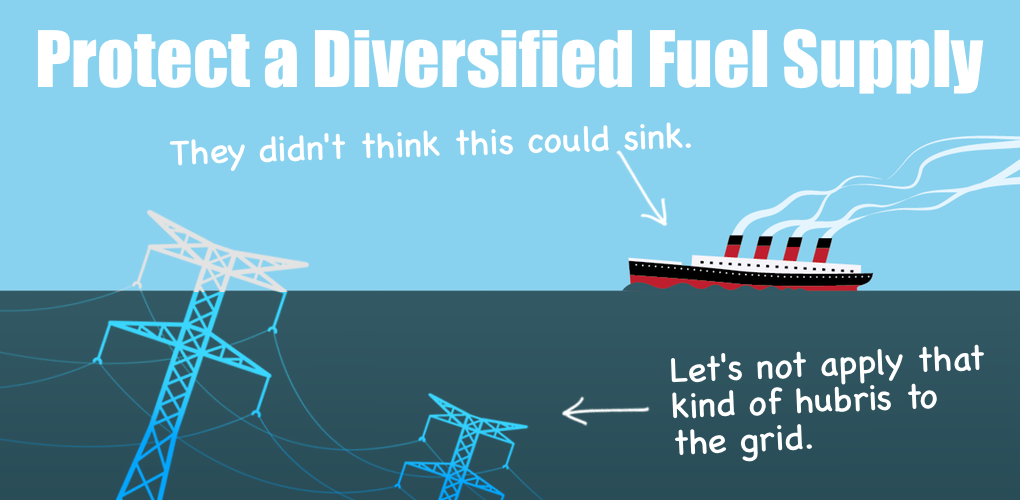
What Could Go Wrong?
December 20, 2017
“I cannot conceive of any vital disaster happening to this vessel. Modern ship building has gone beyond that.”
— Captain Edward John Smith, HMS Titanic
“There is substantial evidence showing that …. outages caused by disruptions of fuel supply to generators appear to be virtually nonexistent.”
— Joint letter to FERC from renewable and natural gas industries
Critics of Secretary Perry’s proposed cost-valuation rule for baseload power plants certainly sound confident, almost defiant. The current electric power grid is resilient, reliable and effectively beyond systemic failure, imply producers of renewable energy and natural gas. What can possibly go wrong?
Let’s see.
A power outage shut down Atlanta’s Hartsfield International airport, by some measures the world’s busiest, cancelling more than a thousand flights and stranding thousands of passengers. Georgia Power reported even its back-up systems were disabled. Passengers were grounded for 11 hours at least, causing those who couldn’t fly on planes to fly into rages at cancelled vacations, connections, business meetings, etc. “Fires almost never happen in our underground facilities,” a Georgia Power spokesman told The Washington Post. Sound familiar?
Overzealous provincial officials in China’s frigid north shut down too many coal power plants, plunging almost a third of households, hospitals and schools in 28 cities into freezing darkness. Officials in Hebei, which is evidently no winter resort, admitted that switching too massively from coal to natural gas was “way too much.” An Environmental Ministry spokesman told The South China Morning Post that “some local governments want to push ahead with the program while there are still subsidies.”
An explosion at a natural gas hub in Austria panicked power markets that were already reeling from a closed gas pipeline in the North Sea. The fire occurred “at the worst possible time for a big gas hub to burn,” said a spokesman for Swedish utility Jamtkraft AB. In addition to leaving one dead and at least 18 injured, the blast at the Baumgarten station sent prices soaring across the continent, from Great Britain to Italy, which announced a state of emergency.
The blast outside of Vienna followed by days an “unplanned outage” stemming from a crack in an undersea gas line in the North Sea at Troll, Europe’s largest offshore gas field. Because output was affected in Norway, the UK’s largest supplier, Britain must wait two weeks for LNG shipments from Qatar to ensure sufficient supplies following closure of its largest storage site that supplied up to 10 percent of peak winter demand.
Gas trader Steffen Gurinsky at Germany’s Energyunion GmbH summarized Europe’s plight: “High gas prices, high coal prices and uncertainties about the delivery of gas in all of Europe is driving up power prices.”
Elsewhere, gas supplies are growing but pipelines are stalling. In Richmond, Va., environmental obstructionists sued to block a pipeline connecting gas fields in West Virginia to consumers in North Carolina. The Mountain Valley Pipeline faced “the most rigorous regulatory process” for a comparable project in state history, said the state water board. “So what?” said the Sierra Club and its allies in Appalachian Mountain Advocates. Natural gas, once wooed by the Club as a bridge fuel, is now dismissed as a carbon plague carrier.
Finally, the Electric Reliability Council of Texas this week projected plunging reserve margins after Luminant announced the end of 4,000 megawatts of coal-based power in early 2018. “Reserve margins are expected to fluctuate in the current market design,” said ERCOT, but “a variety of tools” can maintain reliability even as the level next summer is expected to be less than half of the level projected in May. The size of the drop reportedly surprised state energy experts. Still, no icebergs in sight so far.
All these incidents, doubtless just the most publicized, occurred this month. Space limitations prevent relating every disruptive event that exposed the unreliability of grids and their infrastructure in 2017. We can hope for smoother sailing in 2018 but better to build lifeboats just the same.
- On December 20, 2017
